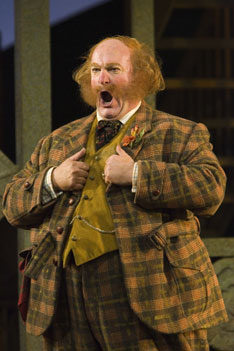 |
| Vaughan Williams: Sir John in Love Andrew Shore as Falstaff at ENO in 2006 |
Sir John in Love, RVW's 1929 opera based on Shakespeare, is perhaps his most conventional opera though it only occasional reaches the stage and when it does, critics tend to moan that it isn't Verdi or Nicolai. RVW's retort would probably be 'that is the point'. He wrote his own libretto, based on Shakespeare, but adding other Elizabethan lyrics, and the work is very much a product of his own imagination.
There is a welcome chance to experience RVW's Sir John in Love once again as British Youth Opera has announced that it is their Summer opera and they will be performing it at Opera Holland Park in August. These will (probably) be the work's first performances in the UK since 2006 (when English National Opera performed it, see my review). And those 2006 performances were the first professional performances in the UK since 1958. The work was premiered at the Royal College of Music in 1929 and it has always had a tendency to be seen as a work for students, young professionals and even amateurs. It didn't have its first professional performance until 1946.
This is partly because RVW wanted to keep as much as Shakespeare as possible. RVW had different intentions to Verdi and Boito. Boito simplified the plot, reduced the number of characters and strengthened Falstaff's part by adding speeches from Henry IV. RVW kept Shakespeare's full cast (twenty named parts), left as much of the plot as possible so that the 'Whitehall Farce' elements of Shakespeare's play are present; but RVW used contemporary Elizabethan/Jacobean poetry to give each of the characters their own lyrical moment.
That's right, 20 named parts. It causes problems in Act One, which can seem over busy but for a company like BYO it is near ideal. One larger scale opera having more roles than a pair of more well-known works and RVW makes sure everyone gets their moment. RVW does use folksong in the music, but only around 15 minutes' worth in the entire piece, all the other tunes are his own though folk-ish in cast.
BYO will be giving four performances with two different casts from 24 to 27 August 2022 at Opera Holland Park, with Southbank Sinfonia in the pit. Further details from the British Youth Opera website.

.jpg)









No comments:
Post a Comment